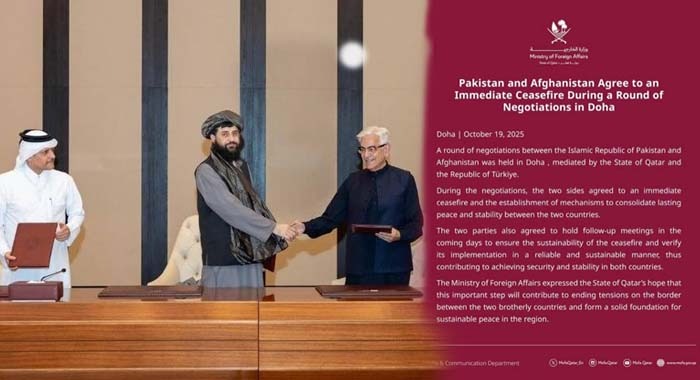In a significant diplomatic breakthrough, Pakistan and Afghanistan have reached a ceasefire agreement following a week of escalating border tensions and cross-border attacks. The deal, brokered with the help of Qatar and Turkey, was confirmed by Pakistan’s Defence Minister Khawaja Asif, who emphasized that both nations would now respect each other’s sovereignty and refrain from using their territories to support terrorism.
Speaking after the talks in Doha, Asif stated, “We have agreed on a ceasefire, and both countries will honour each other’s land. Terrorist activities originating from Afghan soil targeting Pakistan will cease immediately.”
The agreement comes after months of diplomatic protests from Pakistan over the Afghan Taliban’s failure to act against foreign terror outfits such as the banned Tehreek-e-Taliban Pakistan (TTP) and Baloch Liberation Army (BLA), who have been using Afghan soil to launch cross-border attacks. The violence reached a peak with precision strikes in Afghanistan’s Kabul, Kandahar, Nangarhar, Khost, and Kunar regions, and multiple attacks on Pakistan’s security check-posts along the border.
Despite repeated calls from Pakistan to the Taliban on various international forums, including the United Nations and the recent Moscow summit, tensions have remained high. This ceasefire, brokered by Qatar and Turkey, offers a rare moment of optimism for the fragile relationship between the two neighbours.
In his statement, Khawaja Asif expressed gratitude to Qatar and Turkey for their mediation, saying, “We look forward to further meetings, with the next round scheduled for October 25 in Istanbul, where both sides will engage in detailed discussions.”
The first round of negotiations in Doha took place under the hosting of Qatari intelligence chief Abdullah bin Mohammed al-Khalifa, with Pakistani officials led by Asif and Afghan representatives headed by Defence Minister Mullah Mohammad Yaqoob.
Pakistan’s diplomatic efforts to secure Afghan cooperation against cross-border terrorism have been met with limited success. Islamabad’s protests have included appeals to global platforms like the UN and regional forums such as the Moscow summit. While some progress has been made, the persistent reluctance of the Afghan Taliban to act decisively against these terror groups has strained relations. The ceasefire agreement offers a glimmer of hope for peace between the two nations, but its implementation will be closely watched by both regional and international observers.





